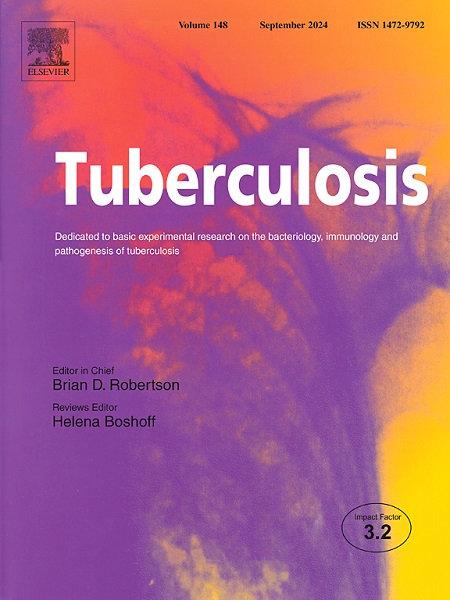印度金奈屠宰牛非结核分枝杆菌的鉴定
IF 2.9
3区 医学
Q3 IMMUNOLOGY
引用次数: 0
摘要
非结核分枝杆菌(NTM)是人类和兽医学中的新兴病原体,全球发病率不断上升。在印度,零星研究已确定NTM感染呈上升趋势,但由于缺乏全国监测,缺乏准确的流行率估计。在全球临床健康的牛和野生动物中报告了非结核分枝杆菌,使结核病的诊断和监测复杂化。本研究旨在通过培养和靶向hsp65基因测序对金奈屠宰牛组织样本中分离的NTM物种进行鉴定。对来自115只动物的118份疑似NTM样本进行了处理,49株分离物经PCR证实为NTM。测序鉴定出18个不同的种,以胞内分枝杆菌(9/49)最多,其次是分枝杆菌sp.菌株79_MI18_10584(6/49)和象分枝杆菌(6/49)。几个已确定的物种,包括胞内支原体、福尔图姆支原体(5/49)、堪萨斯支原体(4/49)和鸟支原体,也在人类中引起感染。牛淋巴结中没有可见病变的ntm表明它们无症状持续存在,尽管有短暂定植的可能性。非结核分枝杆菌通过诱导交叉反应性免疫反应和形成类似于结核分枝杆菌复合体(MTBC)引起的肉芽肿病变,使牛结核病(bTB)的诊断复杂化。这项研究强调了印度牛中ntm的存在和多样性,并强调需要更好地监测,改进分子表征,更好地了解其在兽医和公共卫生背景下的流行病学和免疫学作用。本文章由计算机程序翻译,如有差异,请以英文原文为准。
Identification of non-tuberculous mycobacteria in slaughtered cattle from Chennai, India
Non-tuberculous mycobacteria (NTM) are emerging pathogens in human and veterinary medicine, with a globally increasing incidence. In India, sporadic studies have identified an upward trend in NTM infections, but accurate prevalence estimates are lacking due to the absence of nationwide surveillance. Non-tuberculous mycobacteria have been reported in clinically healthy cattle and wildlife globally, complicating tuberculosis (TB) diagnostics and surveillance. This study aimed to characterize NTM species isolated from tissue samples of slaughtered cattle in Chennai using culture and targeted hsp65 gene sequencing. A total of 118 presumed NTM samples from 115 animals were processed, and 49 isolates were confirmed as NTMs by PCR. Sequencing identified 18 different species, with Mycobacterium intracellulare (9/49) being the most frequent, followed by Mycobacterium sp. strain 79_MI18_10584 (6/49) and Mycobacterium elephantis (6/49). Several identified species, including M. intracellulare, M. fortuitum (5/49), M. kansasii (4/49), and M. avium, have caused infections in humans as well. NTMs in cattle lymph nodes without visible lesions suggest their asymptomatic persistence, albeit there being a possibility of transient colonization. Non-tuberculous mycobacteria complicate bovine tuberculosis (bTB) diagnostics by inducing cross-reactive immune responses and forming granulomatous lesions resembling those caused by Mycobacterium tuberculosis complex (MTBC). This study highlights the presence and diversity of NTMs in Indian cattle and emphasizes the need for better surveillance, improved molecular characterization, and better understanding of their epidemiological and immunological roles in both veterinary and public health contexts.
求助全文
通过发布文献求助,成功后即可免费获取论文全文。
去求助
来源期刊

Tuberculosis
医学-呼吸系统
CiteScore
4.60
自引率
3.10%
发文量
87
审稿时长
49 days
期刊介绍:
Tuberculosis is a speciality journal focusing on basic experimental research on tuberculosis, notably on bacteriological, immunological and pathogenesis aspects of the disease. The journal publishes original research and reviews on the host response and immunology of tuberculosis and the molecular biology, genetics and physiology of the organism, however discourages submissions with a meta-analytical focus (for example, articles based on searches of published articles in public electronic databases, especially where there is lack of evidence of the personal involvement of authors in the generation of such material). We do not publish Clinical Case-Studies.
Areas on which submissions are welcomed include:
-Clinical TrialsDiagnostics-
Antimicrobial resistance-
Immunology-
Leprosy-
Microbiology, including microbial physiology-
Molecular epidemiology-
Non-tuberculous Mycobacteria-
Pathogenesis-
Pathology-
Vaccine development.
This Journal does not accept case-reports.
The resurgence of interest in tuberculosis has accelerated the pace of relevant research and Tuberculosis has grown with it, as the only journal dedicated to experimental biomedical research in tuberculosis.
 求助内容:
求助内容: 应助结果提醒方式:
应助结果提醒方式:


